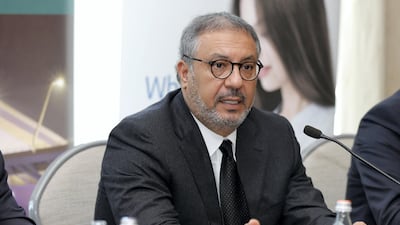Abu Dhabi-based private equity firm Gulf Capital wrote its biggest cheque to date as it backed a $100 million (Dh367m) carve-out of fertility business IVI-RMA Middle East from its Spanish parent firm.
Gulf Capital will now allocate a further $50m to back the company's plan to triple the number of clinics it operates and expand into Asia and Europe.
"This will be our single-largest private equity investment in Gulf Capital's history," the private equity firm's chief executive, Karim El Solh, said at a press conference in Abu Dhabi. "IVI Middle East is one of the leading fertility treatments businesses in the Gulf. We're very impressed with the growth of the business — it's being growing at 30 per cent annually for the last few years."
IVI-RMA Middle East was set up five years ago by Spanish fertility treatment business IVI-RMA, which operates 46 clinics worldwide.
Gulf Capital is acquiring Middle East operations that comprise three clinics in Abu Dhabi, Dubai and Oman, as well as a regional base within Dubai's DMCC free zone, although chief executive Suresh Soni said "the heart and the brains of the operation are in Abu Dhabi".
The company's medical director, Dr Human Fatemi, said that once established, "we have immediately recognised …. that the prevalence of infertility seems to be higher [than in other parts of the world]". Infertility affects up to 15-20 per cent of the population, he added.
The Middle East business currently undertakes about 2,000 IVF treatment cycles a year, which translates to "sub-$50m" in revenue. The company typically achieves profitability rates of about 20-25 per cent, Mr Soni said.
"What we are trying to do in the next five years is to grow the business north of $200m," he said.
"That is organic growth. If we are involved in M&A, it could be higher."
The deal does not preclude the IVI-RMA Middle East business, which is set to be rebranded, to compete in other parts of the world but does place restrictions on its former Spanish parent from re-entering the Middle East market.
"We have plans, some of them are confidential, but there will be expansion both in Asia and Europe over the next year or so," Mr Soni said.
The company will also use some of the expansion capital to open a new genetics lab in Abu Dhabi.
"The vision is to build a global IVF fertility platform. And we've done it before at Gulf Capital — we've helped companies grow to Asia, Africa," said Mr El Solh. "It's something we've specialised in — backing regional champions and making them global players."
A paper published last year by Colliers International estimated the IVF market in the Middle East is worth about $1bn, with the global market valued at $10bn-$12bn.
"IVF is not only sought after locally but is one of the leading treatments undertaken by medical tourists in the UAE, especially in Dubai. Based on discussions with leading operators, medical tourism accounts for 10 to 15 per cent of the IVF patient volumes," Mansoor Ahmed, director of healthcare, education and PPP for Colliers International's Mena region, said.


